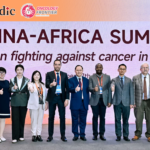
Editor’s Note: In the battle against breast cancer, every physician is a bold explorer, extending the boundaries of life through innovation and dedication. Their efforts not only save lives in the clinic but also drive progress in research, contributing to more precise and effective treatments for breast cancer patients. During the 2024 Chinese Congress of Holistic Integrative Oncology (CCHIO), Oncology Frontier interviewed Dr. Wenxing Qin from Fudan University Shanghai Cancer Center. Professor Qin shared insights into the latest advancements in breast cancer research and treatment, as well as his experience attending the CCHIO. With profound clinical expertise and sharp scientific acumen, he discussed breakthroughs in molecular profiling and personalized treatment strategies for refractory breast cancer, shedding light on future directions in the field.Oncology Frontier: Could you share recent advancements in breast cancer treatment and your experience attending the CCHIO?
Dr. Wenxing Qin: The field of oncology is advancing at a remarkable pace, particularly in breast cancer research, where significant progress has been made in recent years. These advancements can be broadly categorized into a few key areas:
First is the application of novel antibody-drug conjugates (ADCs). Previously, ADCs such as T-DM1 were mainly used for HER2-positive breast cancer. However, the indications for newer ADCs have expanded to include patients with low HER2 expression, hormone receptor (HR)-positive breast cancer, and triple-negative breast cancer (TNBC). For both HER2-positive and HER2-low patients, drugs like T-DXd are now viable treatment options. In addition to T-DXd, emerging ADCs such as sacituzumab govitecan (SG), SKB264, and Dato-DXd have further enriched the therapeutic landscape, significantly improving patient outcomes.
A particularly noteworthy area of progress is in TNBC treatment. Once considered a “cold tumor,” TNBC has seen substantial improvement in prognosis with the advent of immunotherapy and other novel approaches. Immunotherapy is no longer a stand-alone option but is now integrated with chemotherapy, radiotherapy, and endocrine therapy, offering patients more survival benefits.
For HR-positive breast cancer, important strides have been made not only with CDK4/6 inhibitors but also with inhibitors targeting the PIK3CA, AKT, and mTOR pathways. Additionally, patients with ESR1 mutations can now benefit from oral SERD-class drugs.
In summary, the repertoire of therapeutic options for breast cancer is becoming increasingly diverse, treatment protocols are more standardized, and diagnostic and therapeutic approaches are evolving toward greater precision and individualization. These advances collectively enhance treatment efficacy and extend patient survival. I sincerely thank Oncology Frontier for this opportunity to share these updates and look forward to continued progress in breast cancer treatment, bringing new hope to patients worldwide.
About Dr. Wenxing Qin
Title: Associate Chief Physician, Deputy Director of Oncology Department at Fudan University Shanghai Cancer Center Role: Executive Director of the Oncology Department at Fudan Cancer Hospital Xiamen Qualifications: MD in Oncology, Postdoctoral Fellow in Clinical Pharmacy, Master’s Supervisor
- Vice Chair, Young Experts Committee of the Chinese Society of Clinical Oncology (CSCO)
- Standing Member, CSCO Patient Education and Translational Medicine Committees
- Member, CSCO Breast Cancer and Cardio-Oncology Expert Committees
- Member, National Health Commission Oncology Committee for Capacity Building and Continuing Education
- Member, Breast Cancer Professional Committee, Chinese Anti-Cancer Association (CACA)
- Member, CACA Integrative Oncology and Clinical Research Management Committees
- Member, Breast Cancer Youth Group, Chinese Medical Association Oncology Branch
- Shanghai Rising Star in Youth Talent
- Vice Chair, Youth Committees for Breast Cancer and Targeted Molecular Oncology, Shanghai Anti-Cancer Association
- Standing Member, Clinical Drug Research Committee, Shanghai Anti-Cancer Association
Through his research and clinical leadership, Professor Qin continues to advance the standard of care for breast cancer, setting new benchmarks in precision medicine.


